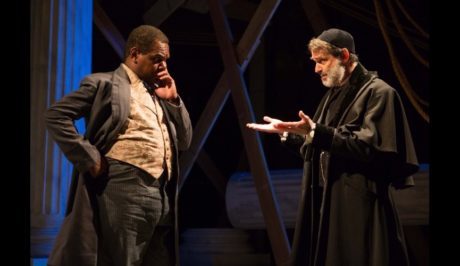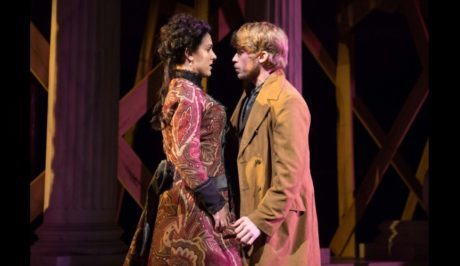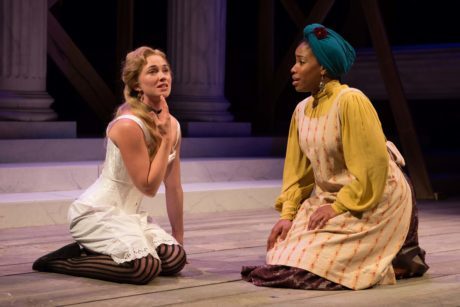Freud said, “When a delusion cannot be dissipated by the facts of reality, it probably does not spring from reality.” This is the essence of prejudice. In showing us a more human side of Shylock (Matthew Boston), and casting an African-American, Craig Wallace, as Antoine (Shakespeare’s Antonio), Aaron Posner has produced an incisive study of power and oppression.

Set in 1870’s Reconstruction DC, District Merchants, a world premiere, is a variation of Shakespeare’s The Merchant of Venice. The play focuses on the two central characters, Shylock and Antoine. Matthew Boston’s Shylock is slim, edgy, and always in motion. He rages and storms, eyes round with anguish, against discrimination, against injustice, against fate. Several of his siblings have died, and so has his wife. Antoine, as played by Wallace, is a stoic, well-dressed businessman, proud yet acutely aware of the suffering of his people. Both Boston and Wallace give memorable performances. In Shakespeare’s play, Shylock and Portia stand out as the sharpest intellects and as natural enemies. Antoine and Shylock are like Sherlock Holmes and Moriarty. They are twinned in our imaginations; it will be a duel to the death, but in the end they are curiously, inescapably alike.
Both have entirely justified grievances. In October 1870’s Atlantic magazine, James Parton wrote a sympathetic account of the persecution of the Jewish people, Our Israelitish Brethren. He notes that in Rome, Jews at that time were not allowed to study art, practice law or medicine, or sing in public. The Jews were scapegoated in the 1873 European-American market crash; German politicians and investors blamed “Jewish financiers.” During the Civil War General Grant famously issued Order #11, expelling Jews from Mississippi, Tennessee, and Kentucky. (The Order was later revoked by Lincoln.)
On the African-American side, blacks, who at that time were approximately one-third of the DC population, were usually domiciled in the swampy, unpleasant parts of town. White violence against blacks was endemic in the Southern states. The Ku Klux Klan would drag people out of their homes and whip them or burn them. When black men held public office, racists would spread rumors that they were illiterate and incompetent.
In a moment of the play which may rightly become widely celebrated, Shylock selects an audience member (the night I saw it, the gentleman’s name was David) and singles him out for the kind of abuse Shylock has lived with all his life. “David,” he growls, his voice dripping with contempt. “One of those….Davids.” You can fill in the blank, of course, with any number of words. “Jew”, “African American”, “rube”, “homosexual”, “trailer trash” or, in a political context, “liberal” or “conservative”, if enunciated with the requisite scorn.
On the website Quartz, an article by Nikhil Sonnad entitled America’s favorite insults by political affiliation, (11/14/14) reports on an analysis by Katherine Martin, a lexicographer with Oxford Dictionaries. Oxford has a unique database which monitors thousands of websites to examine word usage over time. The study concludes that “hack” most often follows the word “liberal”, and “extremist” commonly comes after “Republican”, “right wing”, or “conservative.” In the U.S., liberals are associated more with “elitists” and conservatives with “misogynists”. And then there are the standard insults which made it into the top ten of both groups: “idiot”, “wacko”, and of course “blowhard”. Whichever side you are on, you are apparently pretty sure that the other one is destroying America.

During the Reconstruction, African-American women generally could only obtain jobs as maids, cooks, or laundresses. Portia (Maren Bush), as a white woman, like her maid Nessa (Celeste Jones) has no role in the official power structure despite her wealth. As far as law school in DC, she would have had the choice of Georgetown or National Law School (which later became George Washington University School of Law). Here, Portia, and Nessa are friends, to the extent they can be. They speak openly of the racial and economic gap between them. This disparity leads to tension in their relationship, and at one point, Nessa conceals an important fact from Portia. Celeste Jones as Nessa gives a compelling yet nuanced performance. Maren Bush’s Portia is well-meaning and sensitive. Her reaction when she discovers suitor Ben Bassanio’s secret is a high point of the production.
Seth Rue’s Benjamin Bassanio is a very likeable young man, even when, as he ruefully admits, he is lying through his teeth. He has a warm relationship with father figure Antoine, and he is especially fine in his scenes with Portia. Many blacks did attempt to “pass” for white at this period, as Bassanio does here. Some African-Americans viewed “passing” as an abandonment of the obligation to help other blacks. The actor is so friendly and down to earth that it is not difficult to accept this strategy.
Akeem Davis, as Bassanio’s servant, Lancelot, proves to be a gifted comedian. Dani Stoller’s Jessica appears mesmerized by her Lorenzo (William Vaughan). At that time, Jewish women had to sit in the gallery of the synagogue, because of their supposed “delicacy”. Jewish men recited the morning blessing, “Blessed art thou, O Lord our God, who hast not made me a heathen, who hast not made me a slave, who has not made me a WOMAN.”
Jessica’s father, Shylock, is controlling to the point of absurdity, so it is no mystery why she might want to run away, love affair or no love affair. Lorenzo, whose main disadvantage seems to be poverty, is a voluble hayseed in the tradition of Andy Griffith. Well-played by Vaughan, he is good-natured and has the sense not to mention that he is in some ways less oppressed than the others. Jessica and Lorenzo’s scenes are among the most appealing of the evening.
Costume design by Megan Raham suits the play perfectly. The actors’ clothes are just interesting enough to catch the eye without interfering with the performances. DC-based, Grammy-nominated hip-hop artist Christylez Bacon has composed a very attractive score containing elements of Jewish culture, such as Klezmer music, and African-American culture, such as go-go. Geoff Korf (Lighting Design) and James Garver (Sound Design) maintain this standard of excellence.
Tony Cisek’s set embodies the very concept of the Reconstruction. Stately Ionic columns grace the stage, with one column still under construction. In a way, this symbolizes Reconstruction’s bold effort to restore American ideals of liberty and justice for all. It is reminiscent of a well-known contemporary lithograph by an artist named John Lawrence Giles, now in the Library of Congress. It depicts an allegory of reconciliation between North and South.
The government is represented as a broad, pavilion-like structure with a frieze showing the Senate, the House of Representatives, the Supreme Court, and the Cabinet. The outside ring of columns represents the states. The old bases of the Confederate columns are being removed. They are called “The Foundations of Slavery.” The new ones contain the words “Justice, Liberty, and Education”

Of course, Reconstruction did not last. In 1876, Rutherford B. Hayes won a disputed election. He withdrew federal troops from the South, and ultimately presided over the end of Reconstruction. White Democrats once again began to control the South. And at the turn of the century came the long dark night of Jim Crow.
Director Michael John Garces has designed the production to form a bond between actors and audience. The actors talk to the spectators as a friend might, in a sincere, natural way. Because this approach dissolves the boundary between actor and audience, the 4th wall is unnecessary, and performers can do what they do best; connect with the audience.
Matthew Boston, in an interview with NPR’s Kojo Nnamdi, discusses how far Shylock is driven by his own pain. “We all have our metaphorical pounds of flesh,” he adds.
The power structure is left unchanged, despite the value of love and forgiveness. Still, the horror of prejudice has been confronted, and eviscerated. What could be more relevant?
District Merchants, besides being an engrossing piece of theatre, contains many lessons for today. Don’t miss it.
Running Time: Two and one-half hours, with one 15-minute intermission.
District Merchants plays through July 3, 2016 at the Folger Theatre – 201 East Capitol Street SE, in Washington, DC. For tickets, call the box office at (202) 544-7077, or purchase them online.
LINKS:
Review: ‘District Merchants’ at Folger Theatre by Jeanette Quick.
Spine: Love, Greed, and Bigotry in The Folger’s ‘District Merchants’ by Robert Michael Oliver.





